Will 'Black Lives Matter' change America in an election year?
- Published
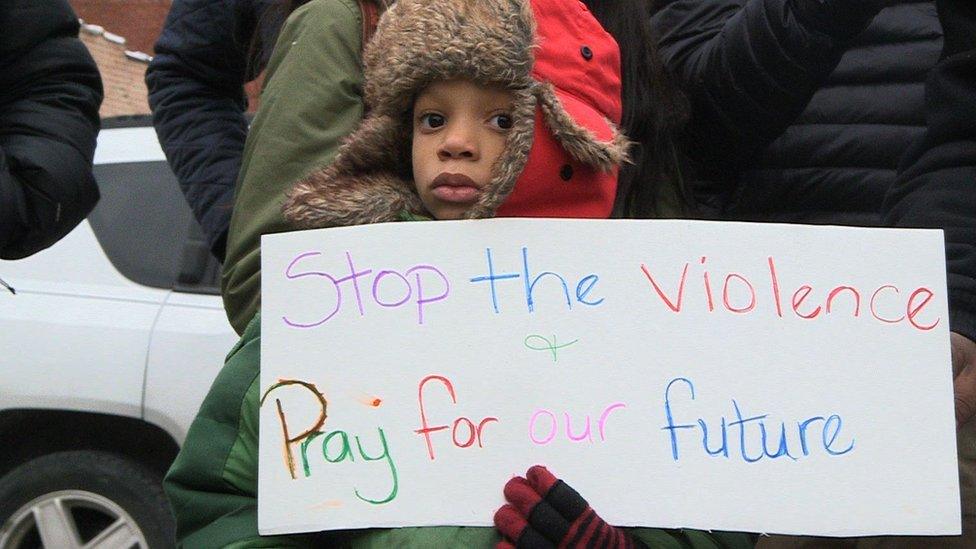
"They killed him for no reason, and they got every excuse in the world as to why they killed him."
These are the words of a grieving mother, Panzy Edwards, who I met on the South Side of Chicago, one of America's most iconic black neighbourhoods. It's a violent place - almost 50 people have been shot dead in Chicago just this year, many of them in this area.
Her 15-year-old son Dakota Bright was shot dead, too. But those who killed him weren't robbers or gang members. They were police officers - the protectors of law and order.
"My baby was a baby," she told me. "And they got every excuse in the world as to why they killed him."
The facts are still murky and despite it being a three-year-old case, it's still under investigation. In the past, the police have said the teenager was armed, a claim his mother refutes.
But the 2012 shooting is suddenly an issue again now, in part because Dakota was black. There are over a thousand deadly shootings by police in the US each year, and those killed are disproportionately African-American.
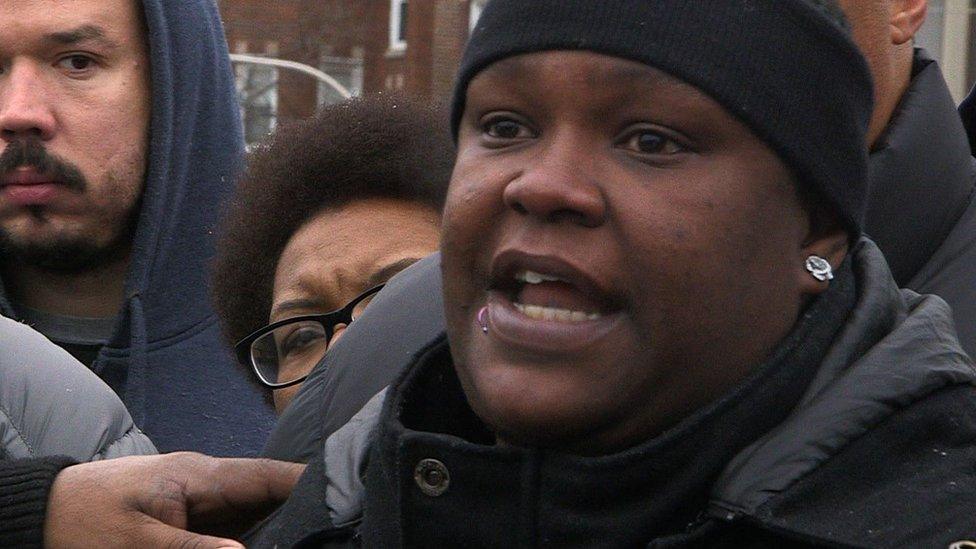
Panzy Edwards, mother of Dakota Bright
Over the past two years, a powerful hashtag and movement has grown up to protest against such killings - "Black Lives Matter". It is a complex, amorphous group: both a formal organisation and, at the same time, a vast informal collection of ordinary people who tweet the slogan.
It's also both a narrow protest movement about police killings and at the same time a broader, radical campaign that argues that racism, first woven into the American system through the original sin of slavery, has never really ended.
But can Black Lives Matter now become a new civil rights movement, a force that will change America in an election year?
"When my son was killed, I couldn't get nobody to stand up with me," says Panzy Edwards. But that's changed now, she says, "because now people are getting tired."
A movement spreads
Black Lives Matter began in 2013, after an in California named Alicia Garza wrote a post on Facebook. "Black people. I love you. I love us," she wrote. "Our lives matter."
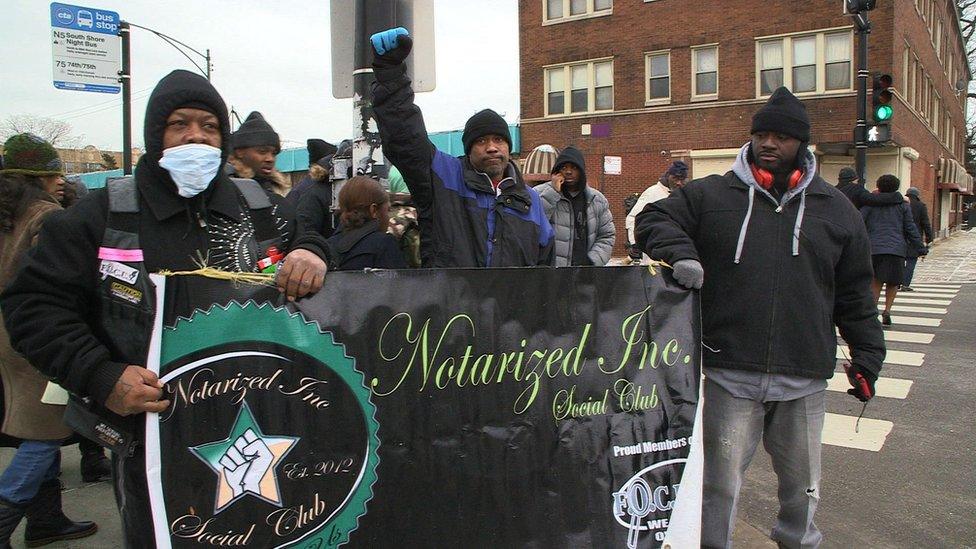
These demonstrators in a Chicago street are protesting police shootings
She was furious that George Zimmerman - not a police officer, but a volunteer for a neighbourhood watch scheme - had been cleared of the murder of a black teenager, Trayvon Martin. She and two others started using the phrase "Black Lives Matter" as a hashtag online.
The idea gained some traction among activists. But the wider world might not have noticed if it weren't for events in a suburb of St Louis, Missouri in 2014. In August of that year Michael Brown, a black 18-year-old, was shot dead by officer Darren Wilson.
Wilson was never charged over the killing because a grand jury, and a federal investigation, saw merit in his claim of self-defence. Despite that, Michael Brown's death unleashed a deeper anger about racial injustice in policing. There were protests, civil unrest and the hashtag Black Lives Matter surged across the country.
And that was only the first time.
Febrile atmosphere
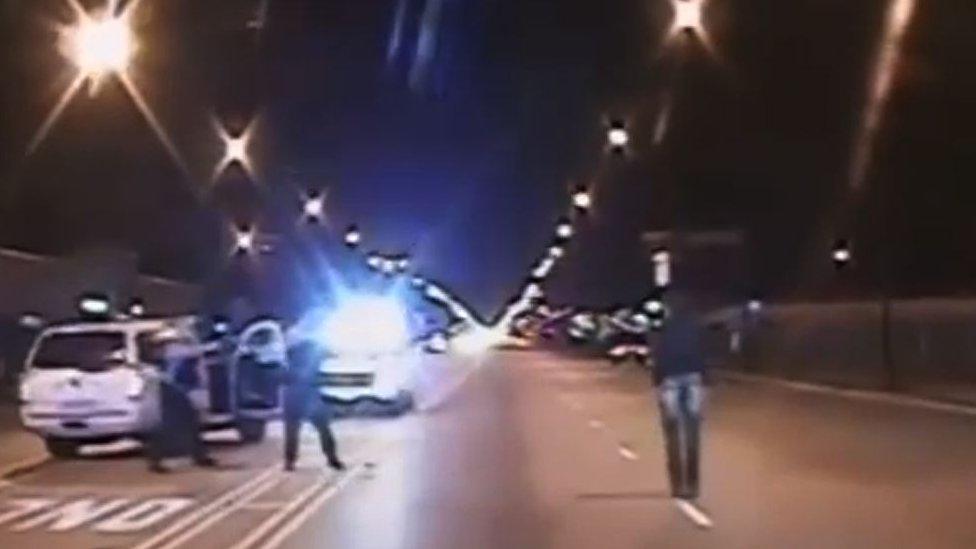
Chicago Police dashcam footage of the killing of Laquan McDonald was released in November 2015
New cases of allegedly unfair police killings of black people now keep emerging around the country. Right now, it's Chicago's turn.
There's a febrile atmosphere on the South Side, with regular protests against the city authorities calling for investigations and resignations. This is the raw end of Black Lives Matter - if there's going to be an immediate political impact of the movement, it's in places like this.
The gathering where I met Panzy Edwards was called at short notice on the South Side. Despite freezing temperatures, around 50 teenagers and older people turn up outside a school and chant for the cameras.
It's organised by William Calloway - a noted 26-year-old activist who helped pressurise the city into releasing a graphic dashboard camera video of a black teenager being shot dead by police.

Black Lives Matter: The Story of a Slogan
Download this special programme as a podcast from the BBC World Service

The video shows Laquan McDonald, 17, who was armed with a knife. A police officer gets out of his patrol car, draws his gun, immediately shoots and then empties the clip into McDonald's lifeless body - 16 shots in all. The officer, Jason Van Dyke, has now been charged with murder.
The incident happened in 2014 but city authorities refused to release the video for more than a year. When they were ordered to by a judge, in November 2015, the political fallout kicked off protests and a political storm that has now engulfed Chicago. "His blood being spilled in the street caused an international uproar," Calloway tells me. "That's why you're here."
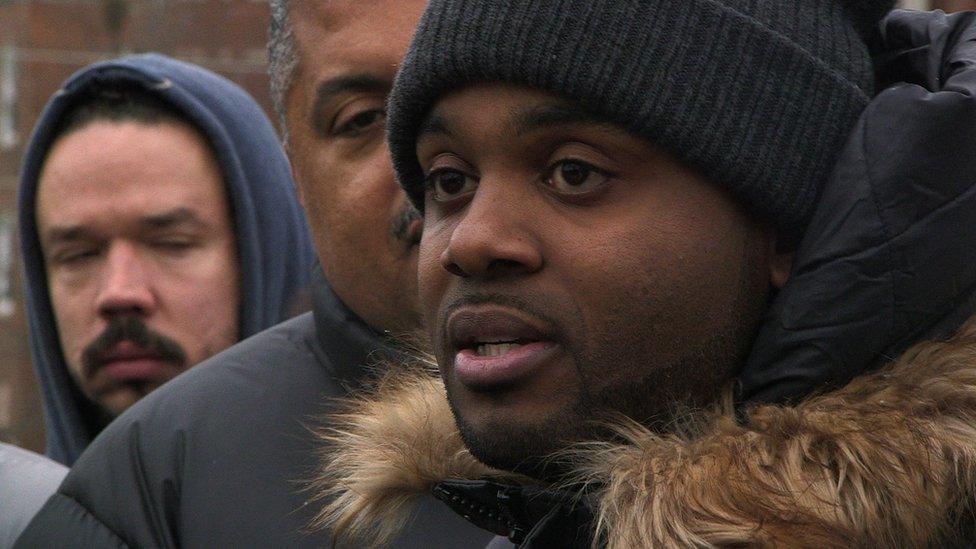
Activist William Calloway's efforts led to the release of a shooting video which, helped by Black Lives Matter, went viral online
"I think we're seeing a more bold and fearless attitude," he adds. "More millennial activists rise up in these days and times to speak out against injustices."
But the police, and their supporters, defend themselves against the criticism - and there's even been a counter hashtag to defend them: "Blue Lives Matter".
"I don't think our members have any aggression towards any race or ethnicity," says police union chief Dean Angelo. "Our members have aggression towards crime. Some of the worst neighbourhoods in our country are a stone's throw from where we are right now."
Local musician Ja'mal Green - now a noted Black Lives Matter activist - says high levels of crime cannot excuse what he sees as discriminatory treatment. The total number of white people shot by police in the US is still higher than the number of black people, but of course white people are in the overall majority. Young black men - just 2% of the population - are nine times more likely than the average American to be killed in police shootings.
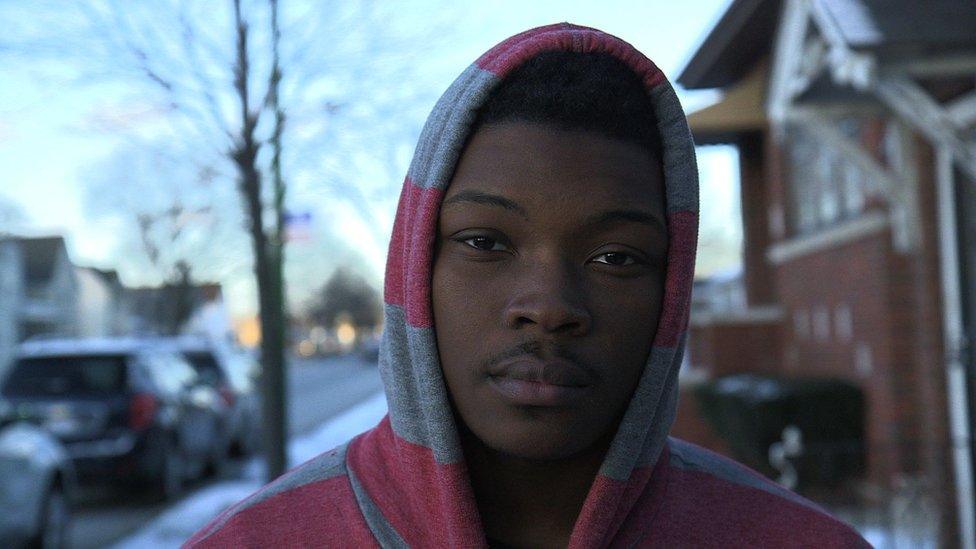
Chicago musician-turned-activist Ja'mal Green
"People have to understand black people are treated different from white," Ja'mal Green says. "Not saying that whites don't count, just that we go through different things. We go through police brutality, racism, things they may not understand."
After the release of the Laquan McDonald tape, Mayor Rahm Emanuel - a former chief of staff in the Obama White House - sacked his police chief and apologised. Ja'mal Green had once worked for the mayor as an ambassador against violence in schools. Now he wants Emanuel to resign - a clear example of using radical protest to try to change America.
'Not your grandfather's civil rights movement'
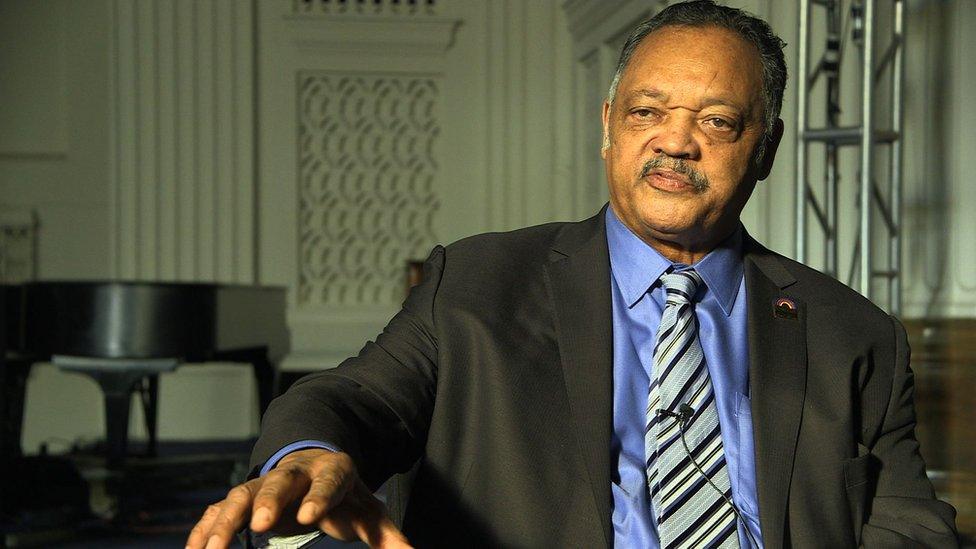
Civil rights "elder", the Reverend Jesse Jackson
For many people, the fact that Black Lives Matter exerts this sort of pressure, and the new and creative protest tactics being used, shows echoes of the black civil rights struggle of the 50s and 60s.
But one of Chicago's young Black Lives Matter activists, Kristiana Rae Colon, has a story to tell about the Reverend Jesse Jackson - the giant of civil rights and black politics who is based in the city, and who once marched with Martin Luther King Jr.
When she got back from protesting in Ferguson, she paid a visit to his organisation on the South Side of Chicago, the Rainbow PUSH Coalition.
"That meeting started out with a member of Rainbow PUSH standing up and saying, 'I don't get why you young people are so disrespectful, don't you know we've been doing this for XYZ number of decades?'" she recalls.
So her group of activists fell out with some of the old guard. The new movement sees the older leadership of black rights organisations as too male and too hierarchical. Having found each other online, they often don't see the need for churches or other religious organisations to be at the vanguard.
But older leaders have criticised the young too - seeing them as too slow to condemn violence.
"I don't advocate violence," says Kristiana Rae Colon. "But I don't condemn justified rage. I don't think you can have change if people are comfortable and complacent. So yeah, sometimes traffic has to stop."
Another criticism of Black Lives Matter is that it lacks clear leadership.
"You must have leaders. A movement without accountability or responsibility is not a sustainable model," I'm told by Jesse Jackson. "Who is accountable, who is to rouse the troops? It can't just be social media. Leaders matter."
But he reacts sagely when I read out some of the rhetoric on Black Lives Matter forums - like one post that describes him as "dethroned."
"I've never sat on a throne," he says. "I'm a servant. I affirm their actions. I believe Black Lives Matter… And so we must be united by purpose and love, not separated by labels."
Mainstream politics
Jackson believes the way to achieve change is to work within mainstream American politics - and form coalitions. After all, he ran for president twice in the 1980s and once mentored a young Barack Obama.
His message is now being heeded in and around Ferguson, Missouri - where there is now a Black Lives Matter PAC, or Political Action Committee. PACs are the grease that keep the wheels of the American political system turning. They raise money, put out messages on the issues and sometimes endorse candidates.
"An election year is an opportunity for Black Lives Matter," says Kenny Murdock, the local radio host who has set it up - despite the fact that other activists think it's better to stay apart from the political fray.
"It is time for us to unite and put up numbers, so that every political party sees that our issues are important to them, or else their candidates do not get into office," he says.
Murdock belongs to the Democratic Party, and at a national level the party's presidential hopefuls - Hillary Clinton, Bernie Sanders and Martin O'Malley - have directly responded to the Black Lives Matters agenda in debates. On the Republican side, the movement has been criticised, for example, external by Donald Trump - which of course means it has been noticed.
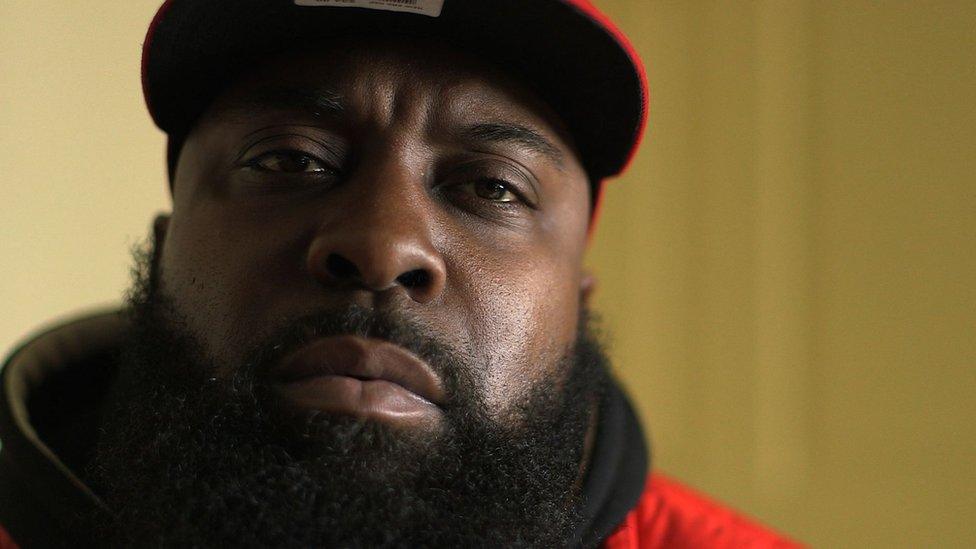
Michael Brown Sr, father of Michael Brown who was shot in Ferguson
In the run-down suburb of Ferguson, I meet the father of the teenager whose killing inspired so much of this. Michael Brown Sr is now something of an activist himself. Despite the fact that the officer who pulled the trigger was never charged, the father believes the rebirth of black radicalism that his son's death helped inspire will now change America.
"Mike opened the doors for those other people, if not him, to get some type of justice," he says. "There ain't no sitting down no more or sweeping up under the carpet. We standing on top of the carpet now and letting you know that we're not taking it no more."
Next item: 5 things we learned from Kanye's epic Twitter meltdown
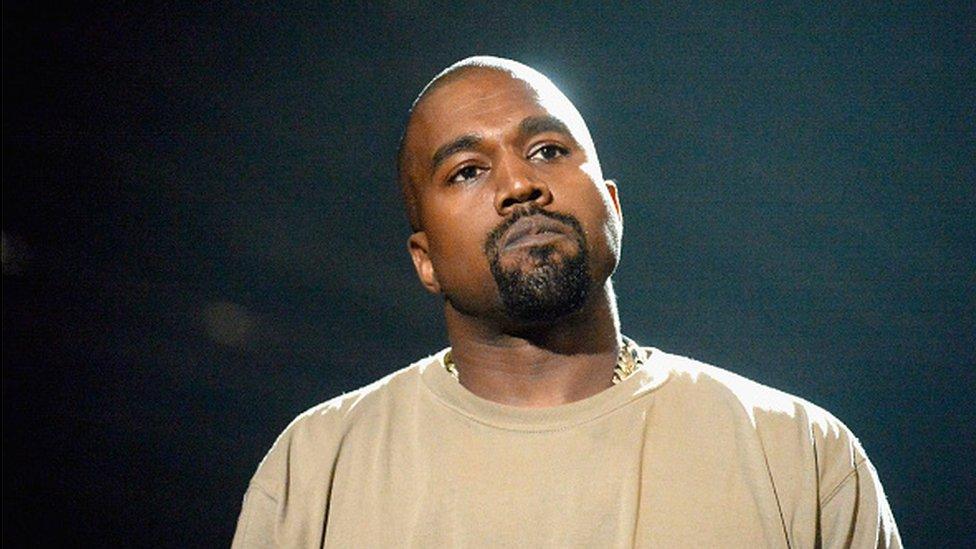
It may well go down in history as the most epic Twitter rant of all time.READ MORE
You can follow BBC Trending on Twitter @BBCtrending, external and Facebook. All our stories are at bbc.com/trending